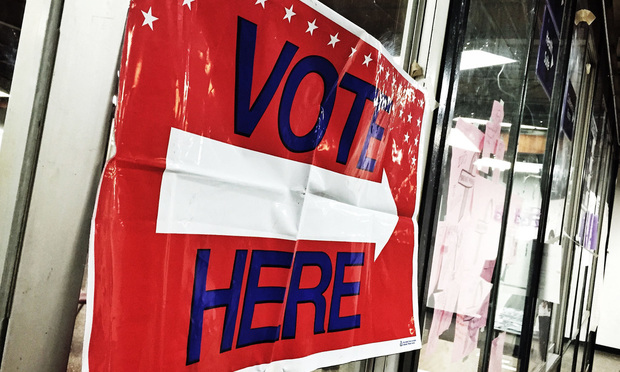Tribes Sue North Dakota for Suppressing Right to Vote in Midterms
Submitted by attorneys from the Native American Rights Fund, Robins Kaplan and Campaign Legal Center, the complaint accuses North Dakota's secretary of state of providing “deeply flawed” systems for assigning and verifying residential addresses that “produce conflicting and inaccurate results.”
October 31, 2018 at 04:31 PM
4 minute read
The original version of this story was published on National Law Journal
 A voting precinct/photo by Diego M. Radzinschi/ALM
A voting precinct/photo by Diego M. Radzinschi/ALM
Members of three Native American tribes looking to vote in the 2018 midterms have filed suit against North Dakota's secretary of state for allegedly suppressing their right to vote.
The complaint, filed on behalf of members of the Sioux Spirit Lake, Chippewa, and Cheyenne tribes, alleges that North Dakota's “unplanned, untested, and broken” law requiring voters to present identification at the polls to prove their current residential address poses “a severe impediment” to their constitutional right to vote. Many Native Americans “simply have no residential address because the government has not assigned them one,” according to the lawsuit.
“Because the systems for assigning and verifying residential addresses are deeply flawed and produce conflicting and inaccurate results, and have generated significant confusion, qualified Native American voters face a substantial risk of being denied the right to vote,” the complaint said, noting that affected voters “have already been denied access to the ballot.”
The experiences detailed by the six plaintiffs vary, though mostly revolve around discrepancies with North Dakota's “My Voting Information,” an online tool used by the state to validate residential addresses and plaintiffs' “911” addresses, a state-issued location for mail and emergency services.
One member of the Spirit Lake Tribe claims his absentee ballot was rejected after his address listed on a state-issued ID didn't appear on the online tool. During a 2012 election, two other plaintiffs—Chippewa members living on a reservation—were assigned an address in a different county that doesn't exist in the online tool, and thus have to leave their current county to vote.
Plaintiffs claim these instances violate their First and Fourteenth Amendment rights, and seek injunctive relief to vote in the U.S. midterm elections on Nov. 6. Matthew Campbell, one of the Native American Rights Fund attorneys representing them, said the state “has pushed through a voter identification system that is confusing and in disarray. And people living on reservations are being most affected.”
“Reservation addresses in the state's database are inconsistent, inaccurate, and uncertain. Homes are listed on streets identified as 'unknown' and in towns that are off the reservations. Figuring out the state's peculiar listings for residential addresses on reservations should not be a prerequisite to voting,” Campbell said.
The lawsuit comes amid a contentious midterm election cycle in which Democrats are looking to flip the House and Senate. Sen. Heidi Heitkamp, D-North Dakota, is currently trailing in polls as she seeks re-election against Rep. Kevin Cramer.
Current state law prevents residents from voting without an ID showing their name, residential address and birth date. Robins Kaplan partner Timothy Purdon, another one of the plaintiffs' lawyers, noted that recent investigations suggest this “threatens to disenfranchise not only those who do not have street access to the necessary ID, but those whose IDs contain addresses the state deems 'invalid.'”
“This is extremely problematic as the lawsuit alleges that North Dakota's system for assigning address appears to be incomplete, contradictory, and prone to error on reservations,” he added.
Indeed, one of the plaintiffs in the suit, a Cheyenne, claims she was unable to receive a Tribal ID supplied by a tribe, as she lives on a Sioux reservation without being a member. The plaintiff wants to vote on election day, the complaint says, but “has not identified any way to obtain an identification or supplemental documentation of her residential address that would allow her to vote on Election Day.”
North Dakota Secretary of State Alvin Jaeger's office said they do not comment on pending litigation.
Mark Gaber, senior legal counsel at the Campaign Legal Center who is also representing the plaintiffs, said that “If North Dakota cannot perform the basic governmental function of having a coherent and consistent system of designating street addresses on reservations, then it cannot make having a 'valid' address a precondition to voting.”
This content has been archived. It is available through our partners, LexisNexis® and Bloomberg Law.
To view this content, please continue to their sites.
Not a Lexis Subscriber?
Subscribe Now
Not a Bloomberg Law Subscriber?
Subscribe Now
NOT FOR REPRINT
© 2025 ALM Global, LLC, All Rights Reserved. Request academic re-use from www.copyright.com. All other uses, submit a request to [email protected]. For more information visit Asset & Logo Licensing.
You Might Like
View All
12-Partner Team 'Surprises' Atlanta Firm’s Leaders With Exit to Launch New Reed Smith Office
4 minute read
Morgan Lewis Shutters Shenzhen Office Less Than Two Years After Launch

After Breakaway From FisherBroyles, Pierson Ferdinand Bills $75M in First Year
5 minute read
Judge Rejects Walgreens' Contractual Dispute Against Founder's Family Member
5 minute readTrending Stories
- 1'A Death Sentence for TikTok'?: Litigators and Experts Weigh Impact of Potential Ban on Creators and Data Privacy
- 2Bribery Case Against Former Lt. Gov. Brian Benjamin Is Dropped
- 3‘Extremely Disturbing’: AI Firms Face Class Action by ‘Taskers’ Exposed to Traumatic Content
- 4State Appeals Court Revives BraunHagey Lawsuit Alleging $4.2M Unlawful Wire to China
- 5Invoking Trump, AG Bonta Reminds Lawyers of Duties to Noncitizens in Plea Dealing
Who Got The Work
J. Brugh Lower of Gibbons has entered an appearance for industrial equipment supplier Devco Corporation in a pending trademark infringement lawsuit. The suit, accusing the defendant of selling knock-off Graco products, was filed Dec. 18 in New Jersey District Court by Rivkin Radler on behalf of Graco Inc. and Graco Minnesota. The case, assigned to U.S. District Judge Zahid N. Quraishi, is 3:24-cv-11294, Graco Inc. et al v. Devco Corporation.
Who Got The Work
Rebecca Maller-Stein and Kent A. Yalowitz of Arnold & Porter Kaye Scholer have entered their appearances for Hanaco Venture Capital and its executives, Lior Prosor and David Frankel, in a pending securities lawsuit. The action, filed on Dec. 24 in New York Southern District Court by Zell, Aron & Co. on behalf of Goldeneye Advisors, accuses the defendants of negligently and fraudulently managing the plaintiff's $1 million investment. The case, assigned to U.S. District Judge Vernon S. Broderick, is 1:24-cv-09918, Goldeneye Advisors, LLC v. Hanaco Venture Capital, Ltd. et al.
Who Got The Work
Attorneys from A&O Shearman has stepped in as defense counsel for Toronto-Dominion Bank and other defendants in a pending securities class action. The suit, filed Dec. 11 in New York Southern District Court by Bleichmar Fonti & Auld, accuses the defendants of concealing the bank's 'pervasive' deficiencies in regards to its compliance with the Bank Secrecy Act and the quality of its anti-money laundering controls. The case, assigned to U.S. District Judge Arun Subramanian, is 1:24-cv-09445, Gonzalez v. The Toronto-Dominion Bank et al.
Who Got The Work
Crown Castle International, a Pennsylvania company providing shared communications infrastructure, has turned to Luke D. Wolf of Gordon Rees Scully Mansukhani to fend off a pending breach-of-contract lawsuit. The court action, filed Nov. 25 in Michigan Eastern District Court by Hooper Hathaway PC on behalf of The Town Residences LLC, accuses Crown Castle of failing to transfer approximately $30,000 in utility payments from T-Mobile in breach of a roof-top lease and assignment agreement. The case, assigned to U.S. District Judge Susan K. Declercq, is 2:24-cv-13131, The Town Residences LLC v. T-Mobile US, Inc. et al.
Who Got The Work
Wilfred P. Coronato and Daniel M. Schwartz of McCarter & English have stepped in as defense counsel to Electrolux Home Products Inc. in a pending product liability lawsuit. The court action, filed Nov. 26 in New York Eastern District Court by Poulos Lopiccolo PC and Nagel Rice LLP on behalf of David Stern, alleges that the defendant's refrigerators’ drawers and shelving repeatedly break and fall apart within months after purchase. The case, assigned to U.S. District Judge Joan M. Azrack, is 2:24-cv-08204, Stern v. Electrolux Home Products, Inc.
Featured Firms
Law Offices of Gary Martin Hays & Associates, P.C.
(470) 294-1674
Law Offices of Mark E. Salomone
(857) 444-6468
Smith & Hassler
(713) 739-1250








